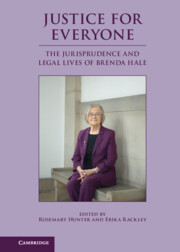Book contents
- Justice for Everyone
- Justice for Everyone
- Copyright page
- Contents
- Figures
- Tables
- Contributors
- Acknowledgements
- Table of Cases
- Table of Legislation
- Table of International Treaties and Conventions
- Brenda Hale Bibliography
- Part I Introduction
- Part II Personal Reflections
- Part III Academic
- Part IV Law Commissioner
- Part V Judge
- Judicial Leadership
- Family Law and Children’s Rights
- 17 Leading the Way
- 18 Debates on Marriage and Cohabitation
- 19 Lady Hale and Financial Remedies on Divorce
- 20 Women and Domestic Abuse
- 21 Public Child Law
- 22 ‘Hang On, What About the Child in This Case?’
- Human Rights and the State
- Private Law and the Individual
- Part VI Creative Encounters
- Index
21 - Public Child Law
from Family Law and Children’s Rights
Published online by Cambridge University Press: 05 May 2022
- Justice for Everyone
- Justice for Everyone
- Copyright page
- Contents
- Figures
- Tables
- Contributors
- Acknowledgements
- Table of Cases
- Table of Legislation
- Table of International Treaties and Conventions
- Brenda Hale Bibliography
- Part I Introduction
- Part II Personal Reflections
- Part III Academic
- Part IV Law Commissioner
- Part V Judge
- Judicial Leadership
- Family Law and Children’s Rights
- 17 Leading the Way
- 18 Debates on Marriage and Cohabitation
- 19 Lady Hale and Financial Remedies on Divorce
- 20 Women and Domestic Abuse
- 21 Public Child Law
- 22 ‘Hang On, What About the Child in This Case?’
- Human Rights and the State
- Private Law and the Individual
- Part VI Creative Encounters
- Index
Summary
Lady Hale played a crucial role in the development of the Children Act 1989 by providing the services of the Law Commission to the innovative Inter-Departmental Review of Child Care Law (the Review), which set out the options for reforming childcare law. This was an exceptionally thorough and effective process, building on work by the Social Services Select Committee, commissioning new research, issuing twelve discussion papers for consultation and holding a residential seminar. Of course, she did not work alone but with an able and knowledgeable team of lawyers and civil servants, particularly Rupert Hughes who served as Assistant Secretary in the Department of Health with responsibility for childcare (see further Chapter 10, this volume). The Act brought major changes, taking the system originally established in the post-war welfare state reforms, the separate provision for care proceedings in the Children and Young Persons Act 1969 and practices based on the development of wardship in the 1970s, to create a comprehensive framework for the whole of public child law, which dovetailed with the scheme for private children law discussed by Eekelaar in Chapter 17, this volume. Lady Hale and Rupert Hughes were the ‘mother and father’ of the Children Act 1989. Hughes retired in 1995, but Lady Hale’s decisions in the appellate courts continued to shape Parts III and IV of the Act at least until her retirement in January 2020.
- Type
- Chapter
- Information
- Justice for EveryoneThe Jurisprudence and Legal Lives of Brenda Hale, pp. 229 - 240Publisher: Cambridge University PressPrint publication year: 2022



